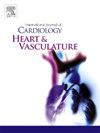Systemic inflammation-based Glasgow Prognostic Score as a prognostic indicator in chronic heart failure
IF 2.5
Q2 CARDIAC & CARDIOVASCULAR SYSTEMS
引用次数: 0
Abstract
Background
The Glasgow Prognostic Score (GPS), based on C-reactive protein and serum albumin concentrations provides useful prognostic information for patients with cancer or acute decompensated heart failure (HF). Herein, we aimed to evaluate the relationship between the GPS and long-term prognosis in patients with chronic HF.
Methods
In this large multicentre prospective observational study, part of the Chronic Heart Failure Analysis and Registry in the Tohoku District-2 (CHART-2) Study, we analysed the relationship between mortality and the GPS in 6,480 patients with chronic HF (mean age, 68 ± 13 years; 69 % male). Patients with elevated C-reactive protein levels (>1.0 mg/dL) and hypoalbuminaemia (<3.5 g/dL) received a GPS of 2; those with either received a GPS of 1, and those with neither received a GPS of 0.
Results
During median follow-up of 9.62 years, 2,564 patients (39.6 %) died. Increased GPS was associated with a significantly higher mortality risk in Kaplan–Meier analysis (log-rank P < 0.0001). This trend was consistent across sex, age, New York Heart Association class, HF stage and type, and cancer history. Adjusted Cox proportional hazards analysis showed the following hazard ratios for all-cause death, relative to a GPS of 0, 1.27 (95 % confidence interval, 1.13–1.44; P < 0.0001) for a GPS of 1 and 1.83 (95 % confidence interval, 1.45–2.32; P < 0.0001) for a GPS of 2. This increased risk was independent of B-type natriuretic peptide levels.
Conclusions
The GPS, which reflects systemic inflammation status, is a useful predictor of long-term prognosis in patients with chronic HF.

求助全文
约1分钟内获得全文
求助全文
来源期刊

IJC Heart and Vasculature
Medicine-Cardiology and Cardiovascular Medicine
CiteScore
4.90
自引率
10.30%
发文量
216
审稿时长
56 days
期刊介绍:
IJC Heart & Vasculature is an online-only, open-access journal dedicated to publishing original articles and reviews (also Editorials and Letters to the Editor) which report on structural and functional cardiovascular pathology, with an emphasis on imaging and disease pathophysiology. Articles must be authentic, educational, clinically relevant, and original in their content and scientific approach. IJC Heart & Vasculature requires the highest standards of scientific integrity in order to promote reliable, reproducible and verifiable research findings. All authors are advised to consult the Principles of Ethical Publishing in the International Journal of Cardiology before submitting a manuscript. Submission of a manuscript to this journal gives the publisher the right to publish that paper if it is accepted. Manuscripts may be edited to improve clarity and expression.
 求助内容:
求助内容: 应助结果提醒方式:
应助结果提醒方式:


